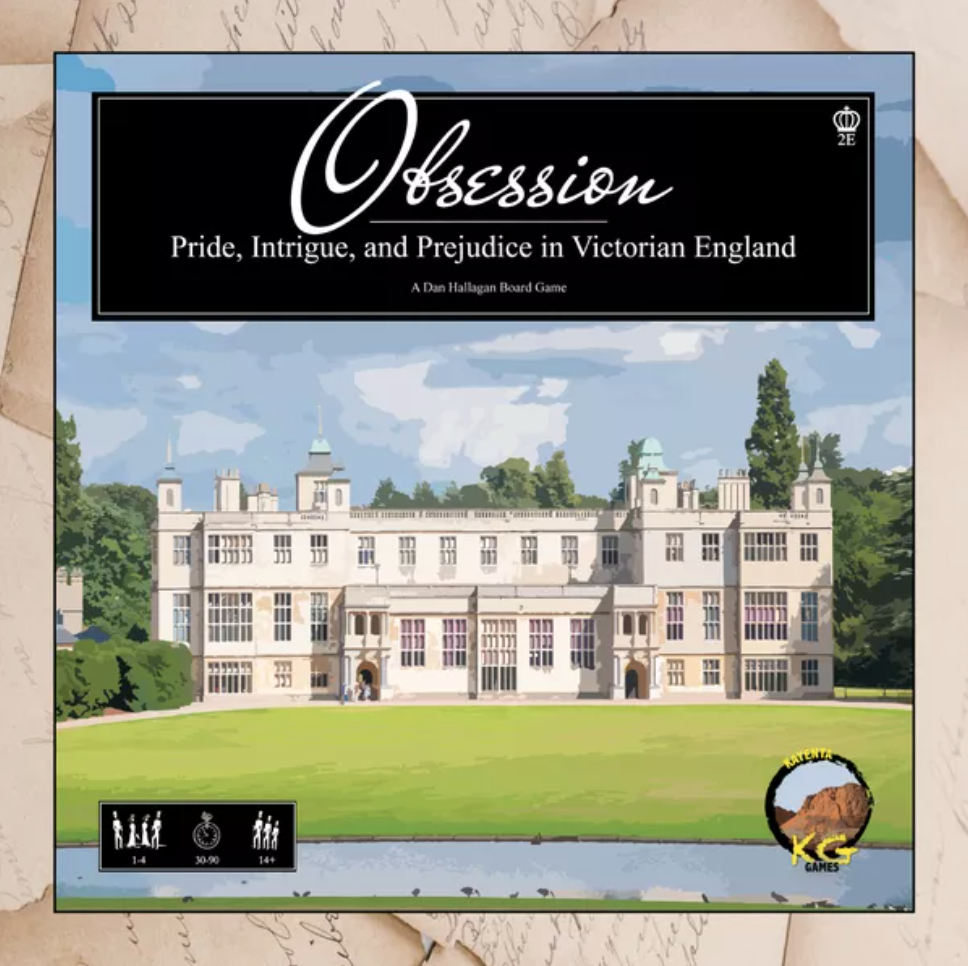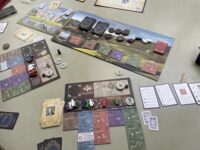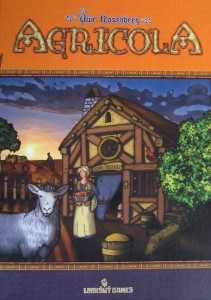- Learning time
- 40 minutes
- First play time
- 120 minutes
Obsession
Designed by: Dan Hallagan
In Obsession the players represent well-to-do families of the 19th century, struggling to remain relevant to the upper echelons of society. Far from paupers, they are nevertheless hoping to improve their reputations by hosting events, inviting VIP guests, and perhaps even marrying into more notable respectability.
Each player begins with their own family board and a set of staff, along with cards representing the family themselves. In each round, you choose one of your available building tiles (five at the start) and assign both the staff and guests it requires: for instance, you might start with Afternoon Tea in the Gazebo, which requires staff to host and guests to consume – and bear in mind, some of the fussier guests also require staff on hand to see to their individual needs! The event you lay on and the guests who attend determine what you receive in return: cash is great, because you can then lay on other events, purchasing further building tiles and adding them to your starting set of five. But you might also add more cards to your deck (-guests) or increase your reputation. As your reputation increases, so does your ability to host events or invite guests, both of which have a reputation level you must meet or exceed.
After the event is resolved you must give all the staff a rest and stand them down temporarily, so as well as managing money you’re also managing available personnel. And as the fifteen rounds pass by a time marker moves along a track, triggering special moments in the game’s narrative such as a builder’s holiday that lets you buy multiple building tiles, and the three courtships, where the player who has best met the current whims of available suitors (eg most staff buildings) claims an extra, powerful card for their deck until the next courtship.
After the final round, players score points for their buildings, guests, and objective cards: you begin with several but shed a number of them at certain junctures of the game, allowing you to try and marry long-term strategy with short-term goals. The player with the most points wins!
The guru's verdict
-
Take That!
Take That!
There's not a whole lot of interaction.
-
Fidget Factor!
Fidget Factor!
Moderate. As with most games, computing your first experience is a mixture of rules and strategy and waiting for things to come into focus. On a second play, you'll move a lot quicker.
-
Brain Burn!
Brain Burn!
Despite it's rather officious and procedural appearance, Obsession isn't too onerous on the rules and the brain-burning, once you know it, is more about reacting to available options and homing in on your best move.
-
Again Again!
Again Again!
Plenty of variety baked-in here, with each family board having some mild asymmetry and the guests, tiles and objectives all varying from play to play.















Sam says
A game where your progress can be dictated by the cards and, to a lesser extent, the tile draw. It's not exactly a groundbreaker mechanically, and interaction is minimal - players can poach servants from each other, but it's more likely the passive taking-of-tiles that may hamper you. Obsession's saving grace and stroke of genius is the curious theming: privileged toffs at odds with each other could have been a real turn-off, but Obsession's tongue seems firmly set in its cheek, channelling a wry humour recognisable from the wittier period dramas and the books that inspired them. I don't pine to play it over and over, but I've enjoyed my few visits for the odd, wry, stiff-upper-lip drollery.